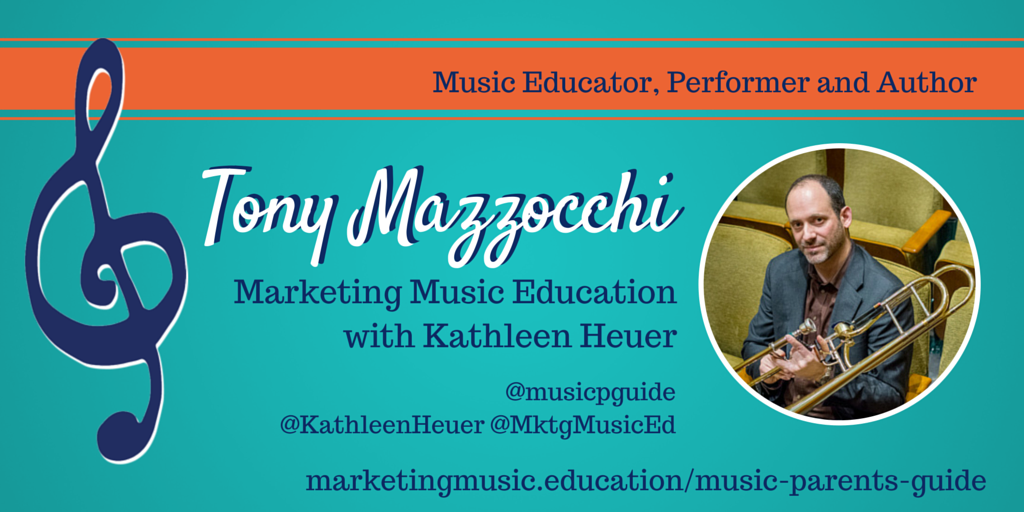 One of the biggest reasons students quit their instrument is because they did not pick the right one (for them) in the first place. If a child doesn’t pick the right instrument from the start, motivation to practice will disappear very quickly. In many cases, finding the right instrument requires some searching — and even some switching — until the right fit is found.
One of the biggest reasons students quit their instrument is because they did not pick the right one (for them) in the first place. If a child doesn’t pick the right instrument from the start, motivation to practice will disappear very quickly. In many cases, finding the right instrument requires some searching — and even some switching — until the right fit is found.
So how does a child find the “perfect match”?
Beautiful Sounds
When I first heard the trombone, I fell in love with the tone it produced. Luckily, I heard it played by a master. In order for a child to choose an instrument for its tone, make sure that it is demonstrated by a professional, not someone who plays it as their second (or fifth!) instrument.
Performances can be heard at a school assembly, local concert, YouTube or internet video, on a CD or DVD, or any other live or recorded performance. Listening carefully to each instrument sound and watching the instrument played is a great way to help a child “identify” with an instrument.
Size Matters
Size can often play a role in choosing an instrument. For some, the huge size of a double bass makes the instrument more attractive. For others, the idea of playing the flute and carrying it in a backpack is a much cooler idea.
Keeping it in the Family
Many students have relatives who played an instrument and want to pass it down. Perhaps a grandfather played the trumpet and handed it down to the grandchild. Other students have an older sibling who played an instrument and want to continue in their footsteps. Others want to make sure they play something completely different than a brother or sister. Be careful not to “force” an instrument on your child just because you already own it — that almost never works out well.
To Switch or Not to Switch?
Many children who begin on piano at a young age choose to switch to another instrument in order to play in a school group (remember, piano is a solo instrument mostly and has limited place in school groups). When a student plays piano, they don’t need to “switch”; they can play piano and another instrument as long as they are willing to practice a bit more.
Knowing what role an instrument plays in different ensembles is very important. If a student plays the flute and wants to play in jazz band, switching to the saxophone is a common transition (learning the fingerings on sax is easy once you know the fingerings on flute). Again, the student can continue playing flute in concert band and switch to alto sax just for jazz ensemble. There are many possibilities.
Switching is generally fine, but switching too soon can be dangerous. It takes a few months for a student to sound decent on an instrument, so it’s hard to tell if the instrument is not right for them too soon. The student may be frustrated with the sound (or lack thereof) they are getting on their instrument and want to switch. This is not a good enough reason to switch, most of the time. Given some time, their tone will improve and they may start enjoying the instrument quite a bit. In general, parents should not let a student switch instruments within the first few months of playing.
Executive Decision
Many times, a school band/orchestra director will recommend a switch for a student. Switches to oboe, bassoon, double bass, and french horn often happen in school due to ensemble needs. As long as these switches are approved by the student and seem exciting, they can work out great. Switching to a “rarer” instrument often assures the student a spot in the school’s top ensembles (and sometimes a college scholarship!).
Cost
There is a wide variance in cost of different instruments. A flute can be rented for as little at $75 a year, whereas a french horn will probably be much more. Sometimes the school will pick up the tab for large instruments like the tuba or double bass or esoteric instruments like bassoon or oboe — it never hurts to check.
There is nothing wrong with switching instruments, as long as it is for the right reasons. If a child is not practicing at all, it is hard to believe that a switch to another instrument will prompt regular practice, but you never know! The goal is to encourage extended interest in the craft of playing a musical instrument, so be flexible and pay close attention to the interest level of your child.








A lot of people might find it weird to fall in love with the sound of the trombone over all other instruments, but I’ve always loved the way the trumpet sounds myself. At least in the hands of a great player. Not so much when I get my hands on a trumpet…
Camila Rabin recently posted…How To Throat Sing Like A Tibetan Monk
My child wants to play saxophone and she is halfway through 7th grade. Would that be okay if she played french horn in the first half of school? She played clarinet her 6th grade year. I just don’t know if I should let her switch yet since she’s only played french horn for about 5 months.